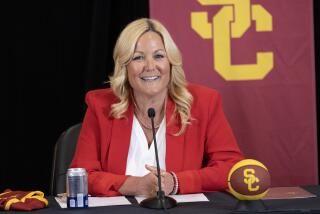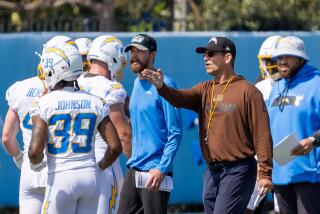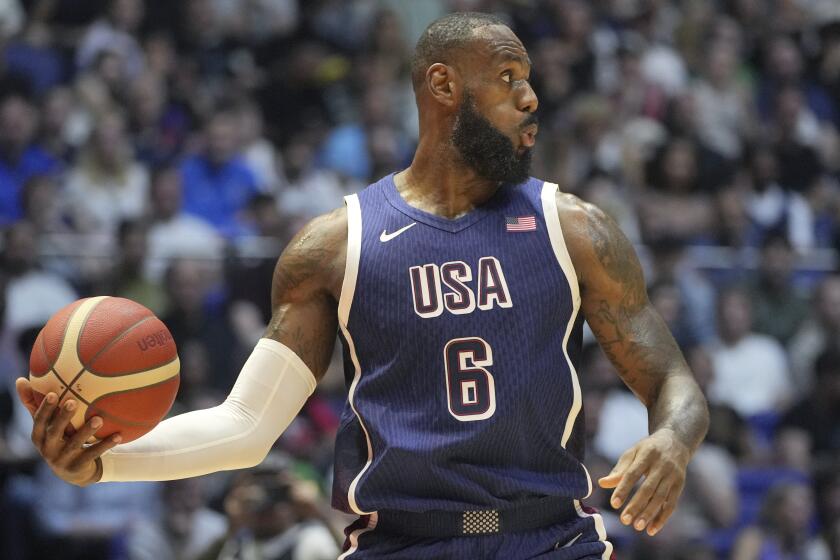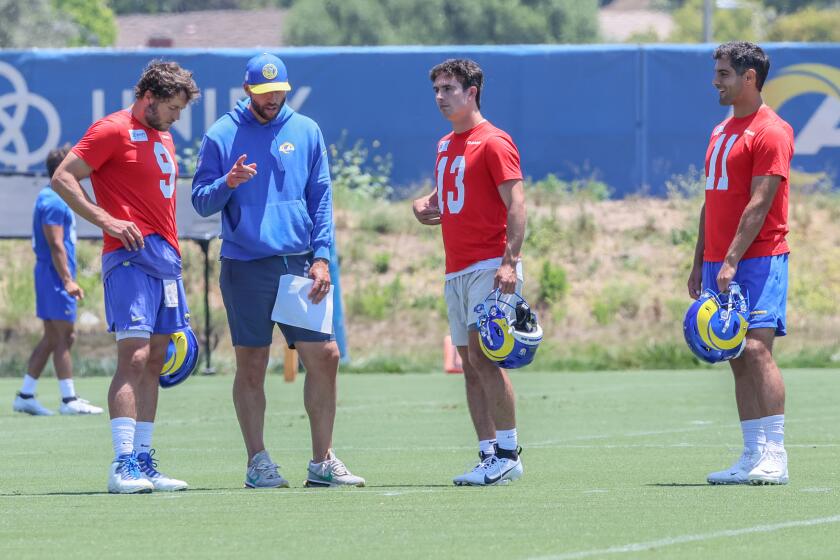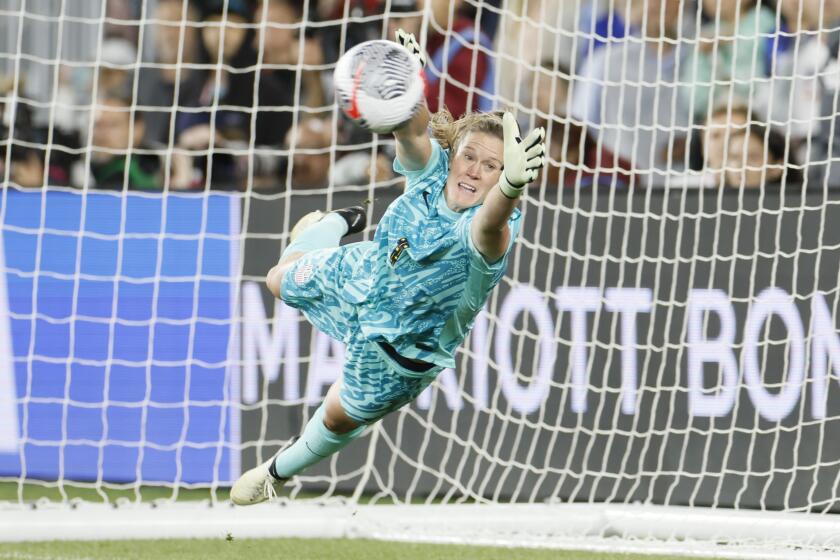Deion Changes the Rules Again : Pro football: This time, however, it’s for better education of athletes with new standards in Florida.
When Deion Sanders intercepted a pass to preserve Florida State’s 13-7 Sugar Bowl victory over Auburn in 1989, the flamboyant two-time All-American unwittingly changed college football in Florida.
But it wasn’t for the game-saving interception in the end zone. Sanders played in the game even though he had not attended classes or taken his final tests the previous semester at Florida State.
When state education officials discovered Sanders’ classroom misconduct later, they were so angry they rewrote the academic standards to ban college football players at state universities from playing in bowl games if they failed to successfully complete the previous semester.
“It was very embarrassing,” said Florida State Coach Bobby Bowden. “So legislative laws were passed that were good laws: ‘If a kid don’t go to class, he don’t play in the bowls.’ ”
The new requirement will go down in Florida football history as the “Deion Sanders rule.” Sanders refused to comment on the rule when asked about it, saying, “My college days are over.”
“Our target is graduation,” said State University System chancellor Charles Reed. “That’s what the universities are all about. That’s the only reason we exist.”
Florida, Miami and Florida State already had academic support programs in place when the “Sanders rule” was approved, but the three universities have stepped up their focus on grades and graduation in the ‘90s.
Even so, they still spend less than 3% of their athletic budgets on academic support: Florida spent $670,000 in 1994-95 on academic support for athletes, Florida State $481,037 and Miami $405,006.
And the state’s education leaders say the graduation rate for football players from the class of 1990 shows plenty of room for improvement: Only five of 17 players have graduated from Florida; 11 of 21 from Florida State; and 12 of 17 at Miami.
Miami’s academic support budget fell nearly $63,000 in 1990-91 because a senior associate athletic director paid out of that budget left the university in 1990. Since then, Miami’s spending on academic support has risen 54%.
Florida State has doubled its commitment to academic support in money and manpower since the Sanders’ incident. It had three full-time employees in its academic support program and spent under $255,000 five years ago.
“We either live up to high standards or we don’t,” Reed said in a 1989 speech at the NCAA Council of Presidents. “Otherwise, when the devil offers us a bowl bid in exchange for our souls, we’ll ask, ‘What’s the catch?”’
Changing NCAA legislation on academics has persuaded coaches to keep a closer eye on their players’ study habits. Reducing the number of football scholarships a college can offer from more than 100 to 85 also has forced coaches to consider academics more closely.
“You know your squad is getting smaller, so you can’t make academic mistakes when you recruit people,” said Miami Athletic Director Paul Dee. “You must recruit people you believe have the ability to complete the education at your institution.”
Bowden and Florida’s Steve Spurrier both have significant financial incentives in their contracts based on graduation rates. And both coaches excuse players early from practice if they have a class or academic priority.
Bowden can earn an additional $17,000 annually if 80% of his players graduate. Spurrier receives one month’s salary--$12,155 in 1994--if 60% of his players graduate, and 10% of his annual salary--$14,586 in 1994--if 80% graduate.
Many athletes come onto campus with SAT scores that are often 250 to 300 points below the school average.
“You look at the average profile of a Florida State freshman, it’s 3.0 and almost an 1100 on the SAT and that student isn’t going to football practice and getting banged around and doesn’t have the demands that our kids do,” said academic support supervisor Roger Grooters. “So it’s definitely a challenge. We’ve found that any kid who is willing to work at it in our system can be successful.”
In addition to full-time staff, Grooters’ department oversees about 100 graduate and undergraduate students who serve as tutors and schedule as many as 600 appointments each week with Florida State athletes.
The support programs run with the clockwork of a Marine boot camp--and often carry military-style punishments.
At Miami, players are required to attend 10 hours of study hall per week.
“If you didn’t complete your hours, you’ll be up at 6 o’clock running--not jogging--running,” said Miami receiver A.C. Tellison. “That turned a lot of heads and got a lot of people into study hall. After one time, I learned my lesson.”
Tellison, drafted by the Cleveland Browns, is one of four Hurricane players recruited in 1990 who will move into pro football with a degree.
Miami’s 1990 freshman class was particularly challenging for Anna Price, assistant athletic director in charge of the Hurricanes’ academic support since 1988.
“Like anybody in a new system, they’re going to test the system. And they tested it. They didn’t believe they needed much academic support,” she said. “They were good kids, but I had to fight them a lot.”
Miami safety C.J. Richardson, an All-American last season, graduated in December with a degree in criminology. He was part of the recruiting class of 1990.
“I won’t say my class was the worst ever, but our first semester here, our average GPA was like a 1.0 or 1.1,” Richardson said. “If not for Anna and the support group, a lot of guys in my class wouldn’t have made it. I think 75% would be gone by now.”
And the academic standards are getting tougher.
“The question is: How much should you raise the minimum standards to ensure you have academically sound people attending your institution?” said Dee.
The University of Florida has been a leader in academic support with a wide range of services designed to help athletes succeed in the classroom.
Farrior Hall, a state-of-the-art academic support center, will become home to the Office of Student Life and the university’s Advising Center this fall. The $3.6 million, 31,800-square-foot center, located a block from the football stadium, will have offices, 15 tutorial rooms, two video rooms, two computer labs and a study area.
“We’ve gone from a time when basically there was no structure and schools were tutoring kids just to keep them eligible to a total life structure, trying to prepare kids for the rest of their lives,” said Keith Carodine, associate athletic director for academic affairs.
Florida has mandatory study halls as well as mandatory course review sessions. Carodine estimates athletes spend anywhere from five to 10 hours in the sessions each week.
“Some kids are going to resist,” he said. “But once they come in and see how helpful it can be, you don’t have a problem.”
When team awards were presented last month at halftime of the annual Orange & Blue intrasquad spring game, Florida players were honored for their accomplishments on the field as well as in the classroom.
At Florida State, Grooters points proudly to linebackers Derrick Brooks and Ken Alexander as success stories: both finished their undergraduate degrees in less than four years and won NCAA postseason scholarships.
Alexander, the leading tackler on Florida State’s 1993 national championship team, will begin law school at Florida State in August aided by more than $30,000 in NCAA scholarship money.
Brooks, who signed a $3.2 million contract with the Tampa Bay Bucs, would also like to become a lawyer after his playing days.
It isn’t easy for players to stay in school after turning professional.
Florida State’s Kez McCorvey concedes he didn’t always work as hard as he should have on the books, but he is on target to graduate after the first summer term with a degree in sociology.
“I had to dig myself out here in the last year or so,” said McCorvey. “But I’m so close, I sure wanted to finish.”
McCorvey, drafted by the Detroit Lions, stayed in school during the spring semester and still attended the NFL combine in Indianapolis and took part in other workouts for pro scouts.
Teammates Clifton Abraham, Corey Fuller and Omar Ellison left Florida State well short of graduation. All were drafted, but only Fuller plans to continue his education.
“I will be the first male in my family to have a degree,” said Fuller. “And I don’t want my son to be able to use it against me someday that I didn’t finish.”
More to Read
Go beyond the scoreboard
Get the latest on L.A.'s teams in the daily Sports Report newsletter.
You may occasionally receive promotional content from the Los Angeles Times.

